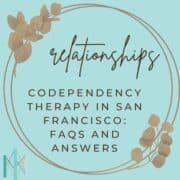
Do you struggle with putting others’ needs before your own? Feel emotionally drained in relationships? Struggle to set boundaries without guilt?
If so, you may be experiencing codependency—a pattern of over-reliance on others for validation, approval, or emotional stability. This can make relationships feel one-sided, exhausting, and emotionally overwhelming.
At our San Francisco-based therapy practice, we specialize in helping individuals regain their independence, set healthy boundaries, and develop stronger self-worth. Whether you’re dealing with codependent family dynamics, workplace stress, or relationship struggles, therapy can help you break free from unhealthy patterns and reclaim your sense of self.
This FAQ page answers the most common questions about codependency therapy, what to expect, and how therapy can help you. If you’re ready to take the first step, reach out today to connect with a therapist who understands the unique challenges of codependency in San Francisco.
Browse our Therapist Directory
1. What exactly is codependency, and how do I know if I have it?
Codependency is a behavioral and emotional pattern where a person prioritizes others’ needs over their own—often leading to low self-esteem, difficulty setting boundaries, and emotional exhaustion. Codependency can occur in romantic relationships, friendships, families, and even the workplace.

2. What are the most common signs of codependency in relationships?
Some key signs of codependency include:
- People-pleasing and difficulty saying “no”
- Fear of abandonment or rejection
- Low self-esteem and seeking external validation
- Over-giving in relationships without getting the same in return
- Emotional exhaustion from always taking care of others
- Difficulty expressing emotions or asserting personal needs
- Staying in unhealthy relationships despite negative consequences
3. Why is codependency problematic?
While being supportive in relationships is healthy, codependency becomes an issue when it leads to self-neglect, emotional burnout, or staying in unhealthy relationships. It can also result in:
- Chronic stress, anxiety, and depression
- Feeling responsible for other people’s happiness
- Difficulty making independent decisions
- Struggling to end toxic relationships
Codependency therapy can help you create healthier relationships while maintaining your sense of self.
Looking for San Francisco therapy to address codependency?
We can help.
4. How does codependency affect mental health? Can it cause anxiety or depression?
People with codependent tendencies are at a higher risk of:
- Anxiety – Fear of rejection, conflict, or disappointing others
- Depression – Chronic emotional exhaustion and self-neglect
- Relationship addiction – Seeking constant validation from others
- Burnout and overwhelm – Overcommitting to others at the expense of personal well-being
- Sleep disorders and stress-related health issues
Breaking free from codependency allows you to prioritize self-care, develop confidence, and build healthier emotional connections.
5. How can therapy help with codependency?
Therapy provides a safe space to explore patterns of codependency, gain self-awareness, and build skills to create healthier relationships. A therapist can help you:
- Recognize unhealthy relationship patterns
- Learn to set and maintain boundaries
- Develop self-esteem and confidence
- Strengthen communication skills
- Address underlying emotional wounds that contribute to codependency
Through therapy, you can stop relying on others for validation and start building self-worth from within.
6. hould I go to therapy alone, or should my partner or family join me?
It depends on the situation:
- Individual therapy – Helps clients focus on personal growth, set boundaries, and develop emotional independence.
- Couples therapy – Can be effective if both partners recognize the codependent dynamic and want to make changes together.
Many individuals benefit from a combination of both individual and relationship therapy to support healing and long-term change.
7. What types of therapy are most effective for codependency recovery?
There are several evidence-based therapy options, including:
- Cognitive-Behavioral Therapy (CBT) – Helps reframe negative thought patterns.
- Dialectical Behavior Therapy (DBT) – Teaches emotional regulation and distress tolerance.
- Family Systems Therapy – Explores how family dynamics contribute to codependency.
- Attachment-Based Therapy – Helps clients heal from past relational wounds.
- Mindfulness-Based Therapy – Encourages self-awareness and stress management.
Learn more about codependency therapy in San Francisco.
8. Codependency in San Francisco: Unique Challenges & How We Help
San Francisco presents unique challenges for individuals struggling with codependency, from high-pressure work environments to complex relationship dynamics.
- Workplace Stress and Over-Accommodation
Many professionals in San Francisco’s fast-paced industries struggle with overcommitting to work at the expense of their personal lives. Therapy helps clients develop work-life balance and assertiveness skills. - Financial Codependency and Cost of Living
In San Francisco’s expensive housing market, some people stay in unhealthy relationships for financial stability. Therapy can help clients build independence and financial self-sufficiency. - Family and Cultural Expectations
Many San Francisco residents, especially first-generation immigrants or those from collectivist cultures, may struggle with family-based codependency—feeling obligated to provide financial or emotional support at their own expense. Therapy helps redefine healthy family roles. - Boundary Setting in Non-Traditional Relationships
San Francisco has a strong LGBTQ+ and polyamorous community, where setting healthy emotional and relational boundaries is essential. Our therapists specialize in helping clients maintain autonomy while fostering secure relationships. - Therapy That Fits Your San Francisco Lifestyle
We offer both in-person therapy in San Francisco and virtual therapy for California residents, making it easy to get support whether you’re working remotely, commuting, or balancing a busy lifestyle.
9. How do I find a codependency therapist in San Francisco?
To find the right therapist:
- Browse our therapist directory for specialists in codependency recovery.
- Schedule a consultation to discuss your challenges and goals.
- Start therapy with a personalized treatment plan.
We offer flexible scheduling, in-person sessions in San Francisco, and online therapy for California residents.
10. How long does it take to recover from codependency?
Healing from codependency is a process that varies for each person. Some people see progress within a few months, while others benefit from longer-term therapy to address deep-rooted patterns.
The key is consistent practice, self-awareness, and a commitment to change.
11. How can I start my codependency recovery process today?
Still have questions? Visit our Codependency Therapy page for a deeper dive into how we can help you in San Francisco.


